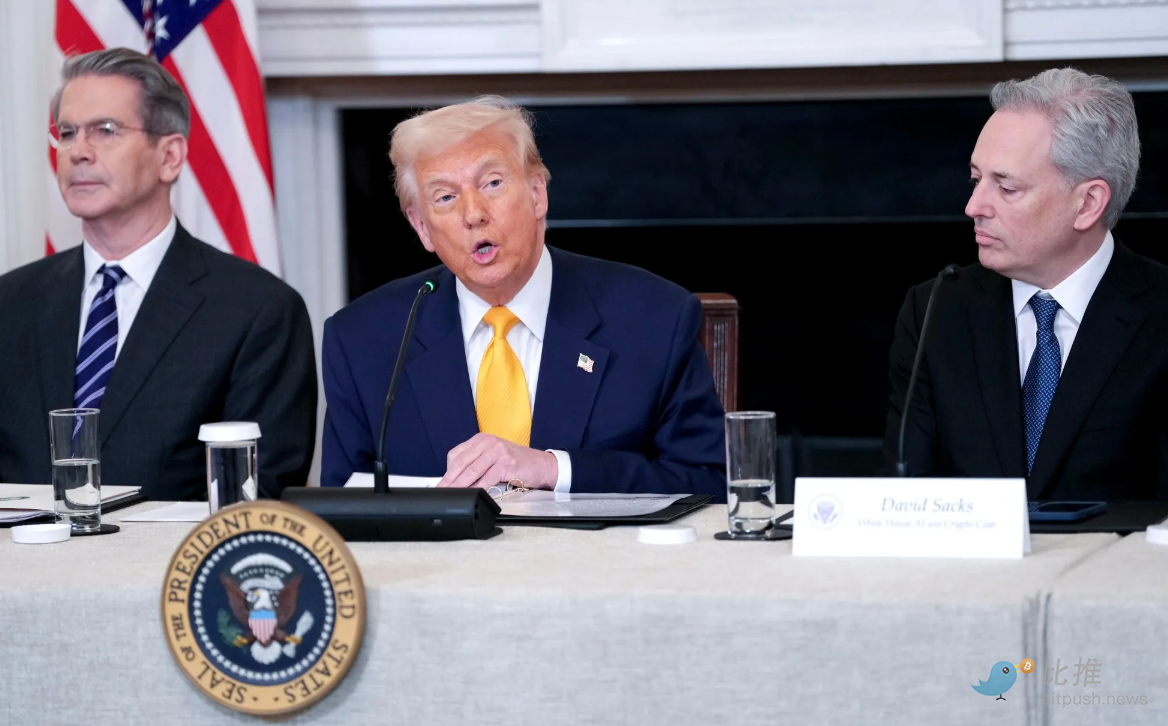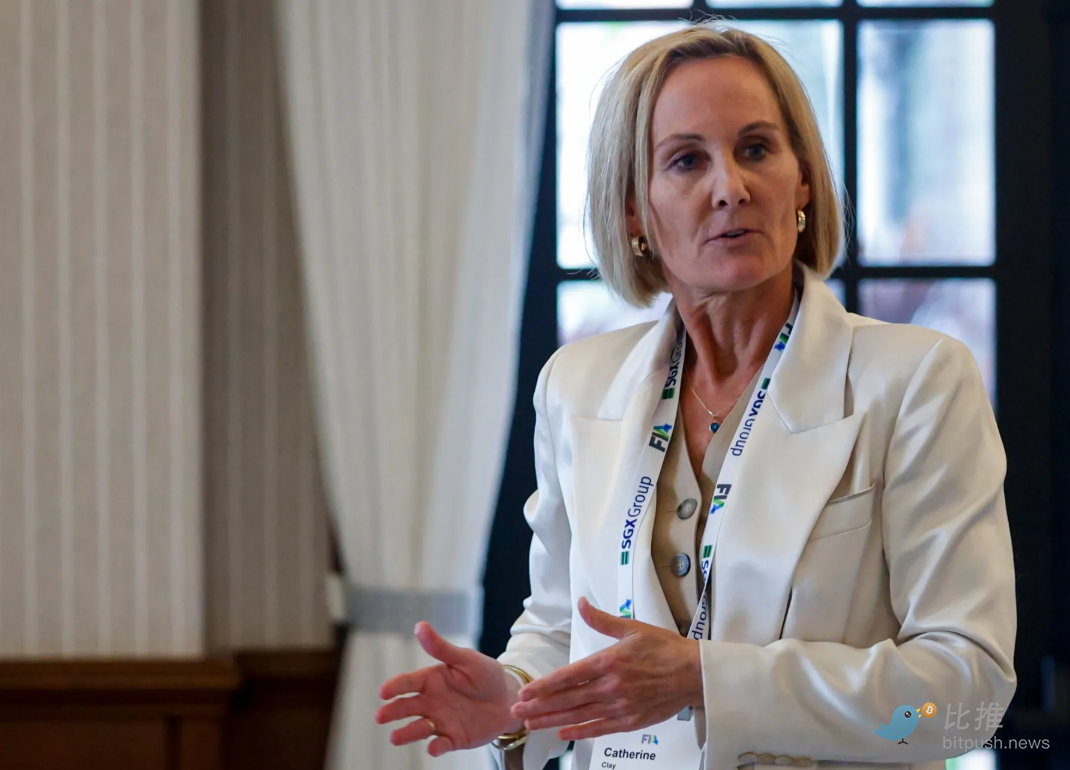Source: Bloomberg
By Katherine Doherty
Original title: Wall Street Goes All In on Great Crypto Comeback Fueled by Trump
Compiled by: BitpushNews Yanan
Just three years ago, a heated debate at the annual global derivatives market gathering, known as the "Davos of the derivatives market", attracted widespread attention. The two sides of the debate were Sam Bankman-Fried (SBF), the famous cryptocurrency billionaire and founder of FTX, and Terry Duffy, the head of the largest futures and options exchange in the United States.
At that time, this confrontation not only highlighted the deep doubts of traditional Wall Street about the new forces in the crypto industry, but also revealed the crypto giant's ambition to subvert the derivatives trading model. SBF hopes to promote digital assets into the mainstream market, while Duffy is a staunch defender of the traditional financial order. The two confronted each other, making this dispute a focus of attention inside and outside the industry.
But that is in the past.
This year, just as executives from the world's largest exchanges and crypto companies were preparing to travel to Florida for a futures industry conference, U.S. President Donald Trump announced that he would establish a strategic Bitcoin reserve. Although this move is more symbolic, it undoubtedly further establishes the legitimacy of digital assets as mainstream financial instruments.

For Wall Street institutions that have only tentatively entered the crypto market before, the next four years will be a rare opportunity. Driven by the Trump administration, the crypto industry is heating up rapidly. On Thursday, Bloomberg reported that World Liberty Financial Inc., a crypto company owned by the Trump family, has held business talks with Binance Holdings Ltd., the world's largest digital asset exchange, and may launch deeper cooperation.
This change in mood and atmosphere was on full display at this week’s conference, held at the Boca Raton Hotel, where traditional finance executives and crypto industry practitioners gathered to exchange ideas. The most noticeable difference was that almost everyone wore suits, or at least collared shirts. The shorts and T-shirts that were the signature of the crypto community in previous years were almost gone, and the scene became much more formal.

Even the entertainment had an old money vibe. Cheap Trick, a legendary 1970s rock band, performed on stage to entertain the audience, who were accompanied by financial heavyweights like New York Stock Exchange President Lynn Martin and DRW Holdings founder Don Wilson.

"The crypto industry is back," said Catherine Clay, head of derivatives at Chicago options giant Cboe Global Markets, in an interview. "We did see the crypto theme return at the Boca Raton conference after a few years of silence."

Donald Trump promised during his campaign to make the United States the "crypto capital of the world," and since taking office, he has certainly been delivering on that promise. He has signed executive orders on digital assets and pushed regulators to take action. His securities regulatory team has formed a task force specifically for the crypto industry, led by long-time supporter of the industry Hester Peirce.
All of this is boosting Wall Street's confidence in the crypto market. Ken Griffin's Citadel Securities, which has been cautious in the digital asset space in the past, is now seeking deeper involvement and plans to become a liquidity provider in the cryptocurrency market. Meanwhile, CME Group Inc. is expanding further with the launch of Solana futures after surpassing Binance to become the world's largest bitcoin derivatives exchange. And according to people familiar with the matter, Intercontinental Exchange Inc., which has kept its distance from the crypto market in the past, has also begun to see opportunities and is preparing to enter the market to compete directly with its old rival CME.
Overseas exchanges have also followed suit. At the conference, Singapore Exchange Ltd. (SGX) announced plans to launch Bitcoin perpetual futures in the second half of this year. The company said its first digital asset contract will be strictly for institutional clients.
“By the end of the year, there will be more companies moving heavily into crypto,” Jeanine Hightower-Sellitto, chief business and strategy officer at EDX Markets LLC, a digital asset company backed by Citadel Securities, said in an interview. “There has been a huge shift in sentiment over the past two and a half months, especially since Inauguration Day.”
For Wall Street, this year’s conference also brought a new consensus: blockchain technology, which underpins cryptocurrencies, will be the key to driving 24/7 trading in the U.S. stock market.
Don Wilson, co-founder of DRW Holdings and crypto company Digital Asset, said, "In the past few years, the crypto industry has been full of hype and exaggeration." But in his view, "The difference this year is that the market is really beginning to realize that blockchain technology will play a central role in driving the transformation of the 24/7 trading model."

The cryptocurrency industry lost its former glory after SBF's company went bankrupt and he was convicted of fraud in 2022. That year, the FTX exchange he founded hosted a late-night cocktail party on Boca Raton Beach, handed out branded merchandise at a giant booth in the exhibition hall, and hosted a fireside chat with baseball star-turned-businessman Alex Rodriguez (A-Rod). Because of his lavish spending, everyone from U.S. regulators to politicians and even Tom Brady was willing to listen to his ideas.
But Duffy wasn’t buying it. The industry veteran, who long served as head of the Chicago Mercantile Exchange (CME), began his career on Chicago’s trading floor in the 1980s. He was skeptical of SBF’s ambitious plans. FTX wanted to handle all of its clients’ needs for crypto derivatives independently, using algorithms rather than brokers to help clear trades.
“I brought cryptocurrencies to CME in 2017, and I didn’t even know who SBF was at the time,” Duffy said in an interview this year, calling SBF’s plan “very dangerous from a risk management perspective.”
Duffy didn’t mince words about their 2022 exchange at a Boca Raton hotel bar, calling it “a minor friction.” In an earlier interview with Bloomberg, he recalled telling SBF straight out that he was a fraud and that he had more money in his right pocket than the cryptocurrency executive had in his portfolio. That assertion was reinforced when FTX filed for bankruptcy in late 2022. The bankruptcy uncovered a multi-year scam in which prosecutors said SBF defrauded customers, investors and lenders of about $10 billion.

After the FTX crash, regulators under U.S. President Joe Biden launched a massive crackdown on the cryptocurrency industry. The Commodity Futures Trading Commission (CFTC), the top U.S. derivatives regulator, recovered a record $17.1 billion in enforcement actions last year, most of which came from digital asset cases against FTX and Binance.

Affected by this, some companies have taken the initiative to shrink their businesses and turn their attention to overseas financial centers such as Dubai, Singapore and Hong Kong. Trading giants Jump and Jane Street have reduced their cryptocurrency market-making businesses in the United States. Cboe has closed its cryptocurrency spot business due to the lack of a clear regulatory framework in Washington.
Since Trump took office, the regulatory shackles have begun to loosen. Last month, the U.S. Securities and Exchange Commission (SEC) ended its investigation into Robinhood Markets Inc.'s cryptocurrency business and said it would not take any enforcement action. At the same time, the SEC also withdrew its lawsuit against Coinbase Global Inc., the largest digital asset trading platform in the United States, which had previously accused it of operating an illegal exchange.
In the past month alone, the SEC has dismissed or suspended at least 10 cases against cryptocurrency companies.
Elisabeth Kirby, head of market structure at Tradeweb, a company that operates over-the-counter markets for rates, credit, money markets, stocks and cryptocurrency ETFs, said the rapidly changing regulatory environment is paving the way for institutional investors to participate more deeply in crypto markets.
Banks are also actively trying to grab more cryptocurrency business. Morgan Stanley, which was not active in the crypto field before, is now paving the way for potential IPO clients. Bank of America Corp. executives are discussing whether to further promote trading support for digital asset companies, while Royal Bank of Canada is looking to expand more business after completing its first crypto transaction at the end of last year.
Collaboration was the main theme at this week’s conference, with discussions centering on how traditional finance and the crypto industry can work together.
Even Duffy said he’s now rooting for the crypto industry’s success — after all, average daily trading volume for digital assets on the Chicago Mercantile Exchange (CME) surged more than 200% last year, with $6.8 billion in trades.
“We launched Bitcoin, then Ethereum, and now we just announced Solana,” Duffy said. “I want to see crypto assets become more mainstream.”













